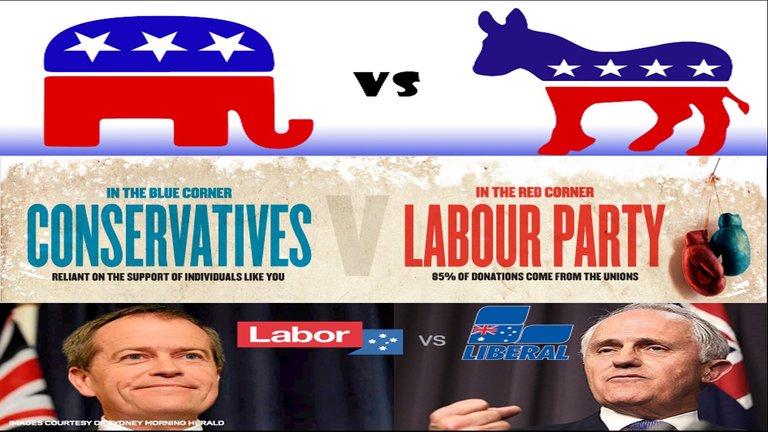
The two-party political system is a system where only two major parties have a realistic opportunity to run the government. One of the two parties holds office and normally forms a majority in parliament. This party is referred to as the majority or governing party. The other major party is referred to as the opposition party. The opposition party has the role of challenging decisions and policies of the governing party.
The two-party system is very common in many countries. Such countries include United States of America, Australia, the United Kingdom and Malta. There are several other countries that have multiple-party systems but essentially act as a two-party system as the parties form coalitions. This results in a de facto two-party system. These countries include India, Jamaica, Brazil, Guyana, and Trinidad and Tobago.
Different political systems of countries
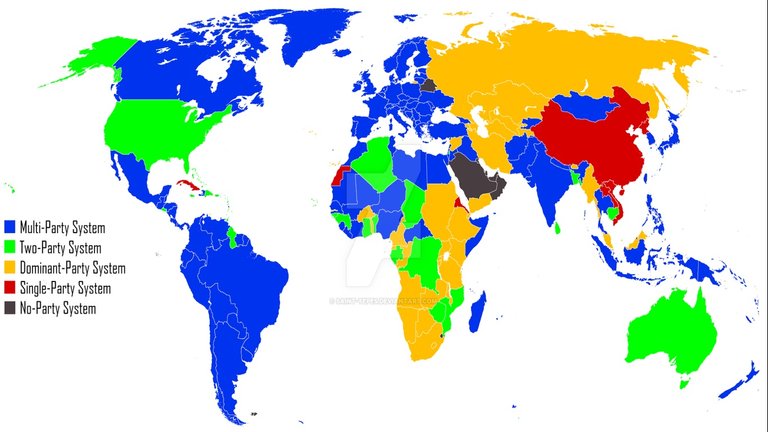
In Australia, the two parties are the Australian Labour Party (ALP) and the Liberal National Party (LNP). These two parties do not differ in any meaningful way. These parties tend to bicker over normally small inconsequential issues in an attempt to create a public perception that they are different. According the Australian Broadcasting Corporation, here are list of some of the major issues that were debated by the two major parties and their respective stances on these issues during the 2016 election.
List of issues debated during the 2016 Australian Federal Election
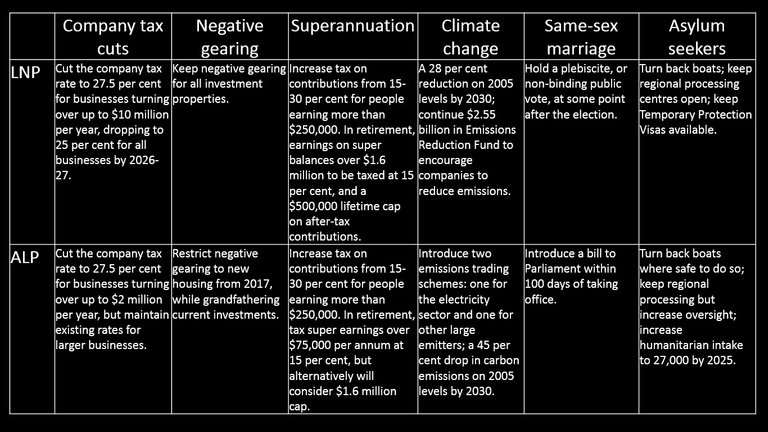
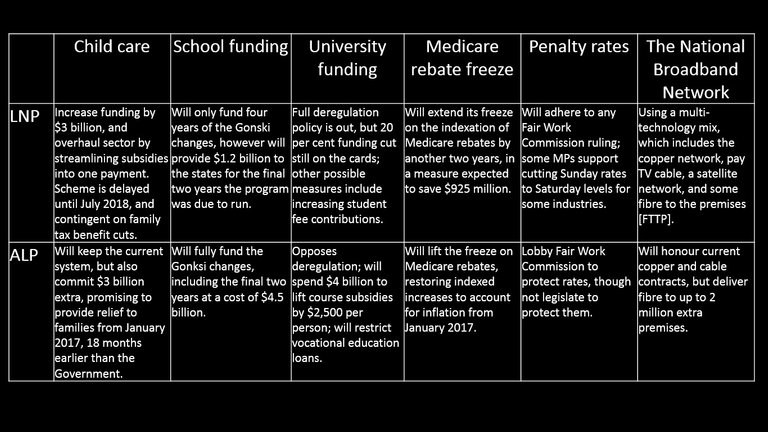
As can be seen from the tables above, the positions taken by the two parties may differ in several areas but the overall outcome of these differences are reasonably insignificant. Most of the issues identified are mostly just one aspect or one policy angle regarding a problem.
Here are a list of some of issues that are seldom debated, partially debated, or not given any attention by either major party.
Issues rarely discussed or debated listed according to category
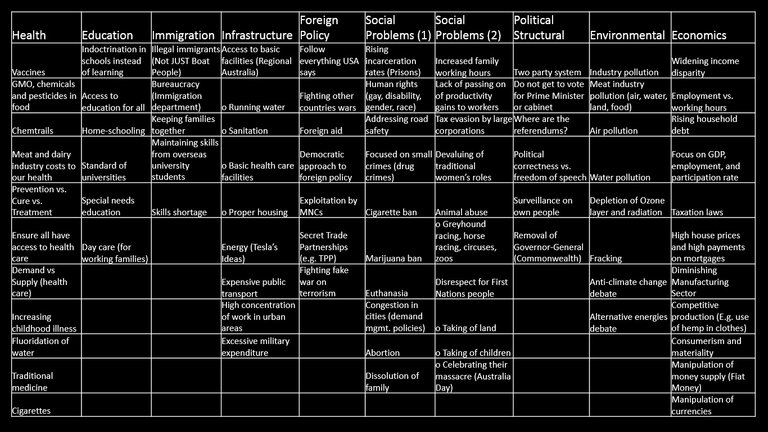
For a more detailed discussion on the above issues/problems see my Steemit posts on democracy. These links are available at the end of the post.
There are a few smaller parties that occasionally get a couple of seats but never come close to challenging the two major parties.
As mentioned earlier, one of the major parties will hold office while the other acts as the opposition. The role of the opposition, ironically, is to prevent opposition. The opposition distracts from the major issues by highlighting smaller inconsequential differences in opinion to create the illusion of opposition. This is to prevent any real opposition from challenging the government on important issues.
The United States of America have a similar situation where a Democrat (Barack Obama) replaces a Republican (George Bush). Barack Obama continues very similar policies to George Bush even though he proclaimed he would be very different in his political campaign.
In the short video below, Noam Chomsky explains that Barack Obama is actually escalating problems blamed on the previous government even though he committed to solve these problems in his campaign.
Here is a link to an interview with Noam Chomsky where he highlights some of the similarities between Barack Obama and George Bush: https://chomsky.info/20090624/.
How is the two-party system maintained?
A key to a candidate or a party becoming elected is exposure. The greater the exposure, the better a candidate or party has of winning the support of the voters. There are several ways to gain exposure such as campaigning, advertising, debates, interviews (television or radio), and meet and greet sessions with the people. All of the above generally requires money.
In Australia, political parties are funded by the taxpayers. This funding is distributed based on the number of first preference votes obtained from the most recent election. The ALP and LNP combined, obtain over 70% of the first preference votes at each election and therefore, obtain over 70% of the funding. The lack of the funding for smaller parties prevents them from growing. The lack of funding also greatly hinders the smaller party’s campaign efforts. The messages from these parties simply do not get heard.

Source: http://www.aec.gov.au/Parties_and_Representatives/public_funding/Current_Funding_Rate.htm
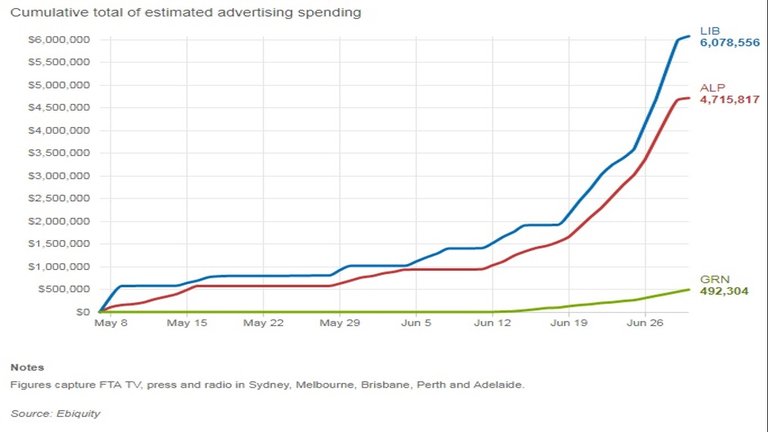
Debates
The televised political debates are held between the Australian Labour Party (ALP) and the Liberal National Party (LNP). The debates allow for great publicity of the candidates and allow them to challenge each other. Candidates from minor parties or independent candidates are deprived of that in Australia.
Debates in the USA
There is a similar problem in the United States of America. The 2016 USA presidential election had six candidates; they were Hillary Clinton, Donald Trump, Jill Stein, Gary Johnson, Darrell Castle, and Evan McMullan. Only Donald Trump (Republican) and Hillary Clinton (Democrat) were invited to the major debates. Without a presence at the major televised debates the other candidates were put at a massive disadvantage. These candidates could not get their views across or challenge the candidates from the major parties (Democrats and Republicans).
In the 1992, Ross Perot (Independent candidate) was allowed to participate in the Presidential Candidates debates. In the 1992 Presidential Election, Ross Perot won 18.9% of the popular vote. Since 1992, the Presidential Candidates debates have only been between Republicans and Democrats. Ross Perot’s percentage of the popular vote was halved in the 1996 Prudential Election. After 1996, no candidate outside the Democrat or Republican parties achieved more than 3% of the popular vote.
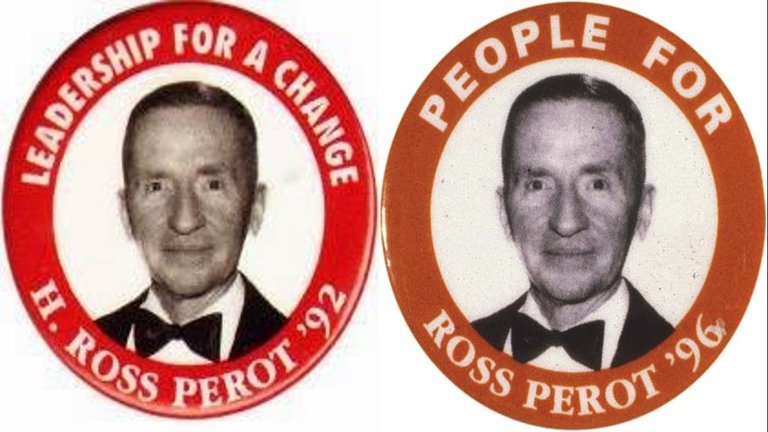
The Ross Perot example in the United States of America is a strong example of the power of exposure and the ability to openly challenge the major party candidates.
The United Kingdom also has a two-party system. The election debates in the United Kingdom allow for participation of candidates outside of the two major parties. This could be a reason why the Liberal Democrats (third largest party in the UK) consistently get around 20% of the vote.
Seats in parliament vs. votes
Unfortunately, the first-past-the-post voting system in the United Kingdom has been the most likely reason that the Liberal Democrat’s high percentage of votes has not translated into a proportionate share of the seats in parliament. The Conservative and Labour parties in the United Kingdom consistently hold over 80% of the seats in parliament even though they receive less than 70% of the vote.
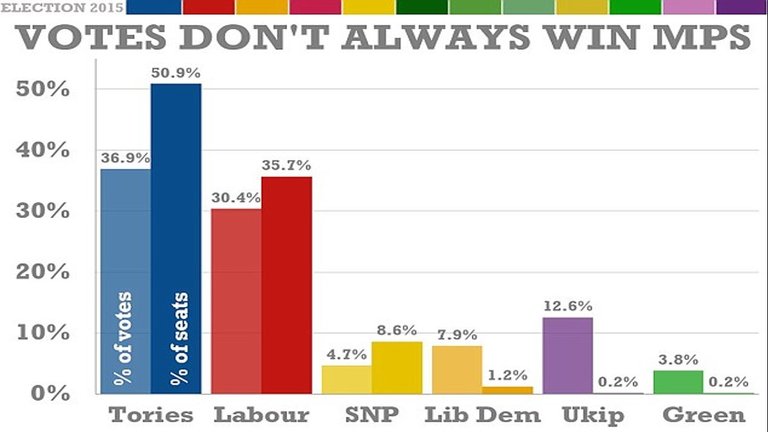
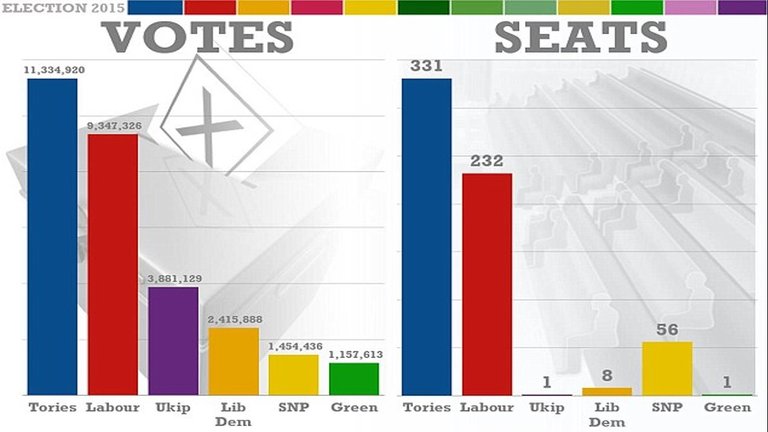
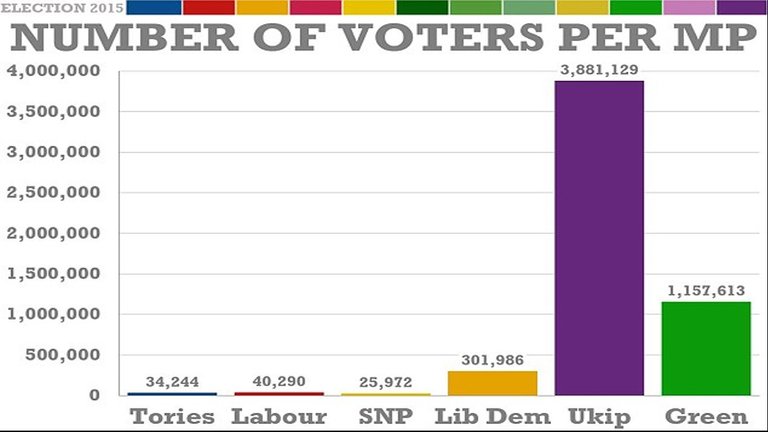
Source: http://www.dailymail.co.uk
Media
The media in Australia generally do not offer balanced coverage of the election candidates. Candidates outside of the major parties are often mocked or made to look radical, incompetent, stupid, or even racist. Popular candidates outside of the major parties include Pauline Hanson, Bob Katter, Clive Palmer, and Nick Xenophon. They have mostly not been portrayed kindly by the media. Any logical arguments that these candidates make are glazed over by the negative image of them created by the media.
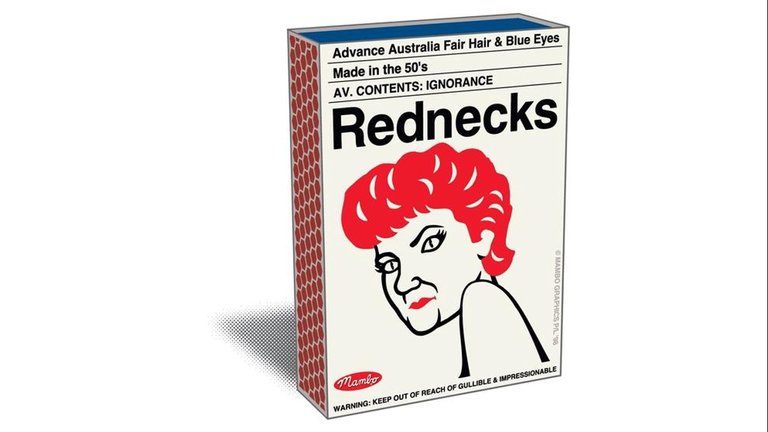
The media in Australia also do a very good job of creating the impression that the Australian Labor Party (ALP) and the Liberal National Party are the only possible options for government. This has resulted in people voting against an incumbent major party by voting for the other major party. People do not vote for the opposition party because they agree with their policies but to simply get the incumbent major party out.
It is all about power
The two-party system has been set-up in such a way that it will always be perpetuated. This has been done using the following methods.
- The control of funding.
- Lack of exposure of alternative candidates.
- Candidates not invited to major televised debates.
- Ridicule of alternative candidates by the media.
- Voting systems that favour the major parties and underrepresent the minor parties.
To be locked into a system where just two parties have all the power greatly reduces democracy and freedom. The two-party system is not a system where two parties compete with each other for the benefit of the people. The two-party system represents one party divided into two factions. One of the parties governs, it does not matter which one, while the other party pretends to oppose the governing party. This approach is more effective than if the two parties merged into one mega-party. One mega-party would hold the power and win an election quite easily but now, it would be apparent that this party has all the power. In response to this power, real opposition is likely to form.

Source: https://twitter.com/nattoman/
The Soviet Union (Russia) had a one-party system. This party was the Communist Party of the Soviet Union. The Communist Party of the Soviet Union was dissolved in late 1991. Russia now has a dominant-party system with the United Russia party capturing most of the votes and seats but their dominance is declining. The United Russia party had 72.3% of the votes in 2008 and only 63.6% of the votes in 2012. The next Russian election is scheduled to be held in 2018.
How to break the two-party system
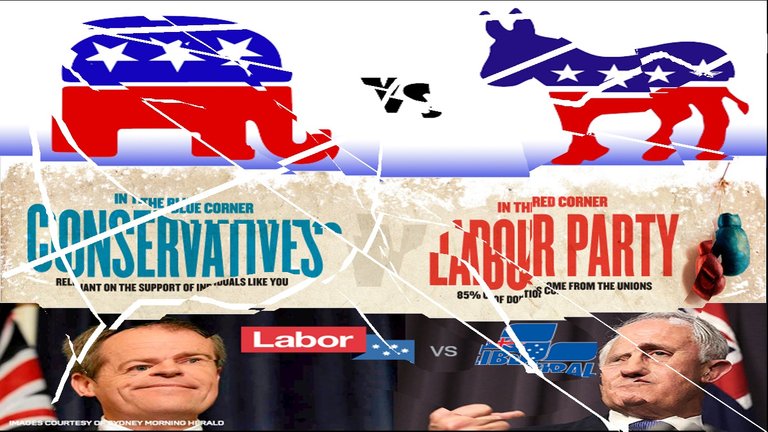
We need to stop voting for either of the two major parties. We should not allocate preferences to either of the major parties. We should not vote for an alternative candidate outside of the two major parties if we don’t know enough about them. This basically leaves us with no voting options. There should be a vote option of ‘none of the above’. If you have no voting options and as ‘none of the above’ is not an option on the ballot, not voting might be your best option or if voting is compulsory, I recommend you spoil your vote. This will not break the two-party system but it will send a message of discontent.
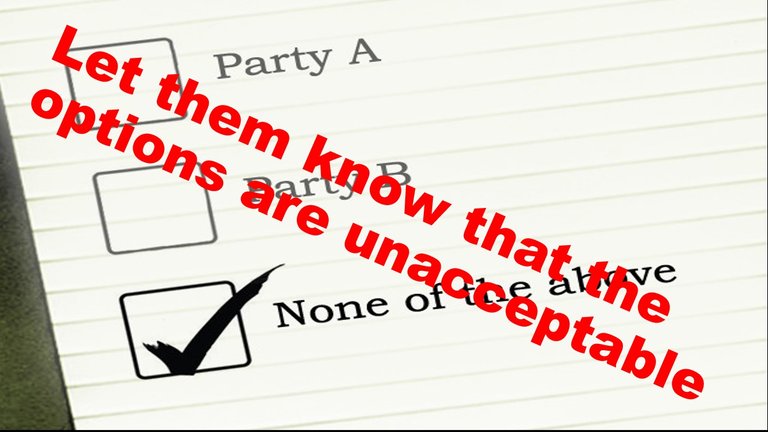
The whole political system needs massive reform. I believe that the party system (any party system) needs to be abolished. I believe that the extent of power that governments currently hold should be greatly reduced. If we have government, it should be restricted to just an administrative role that does not make any major decisions. I would recommend anarchy over a government power structure. The Venus Project is also another interesting alternative, see link at the end of the post.
For this reform to take place, people need to make a statement that the current system is unacceptable. Real opposition needs to form to challenge the status quo rather than the fake opposition that currently exists. Opposition to the current opposition might be good step to make before directly challenging the government.
None of this can happen until awareness about the current dictatorship we live in becomes common knowledge. We can achieve a lot if we all work together. I would like to thank you for spending the time to read this post.
Additional Information
The following links contain a more detailed discussion regarding issues that are not or rarely discussed by the major parties in Australia.
Democracy Part 1:
https://steemit.com/economics/@spectrumecons/economics-and-democracy-does-democracy-exist-part-1
Democracy Part 2:
https://steemit.com/economics/@spectrumecons/democracy-and-economics-part-2-major-debates
Democracy Part 3:
https://steemit.com/economics/@spectrumecons/democracy-and-economics-part-3-areas-rarely-discussed-or-debated
Democracy Part 4:
https://steemit.com/economics/@spectrumecons/democracy-and-economics-part-4-solutions-and-alternative-structure
The following link has information about the Venus Project.
https://www.thevenusproject.com/
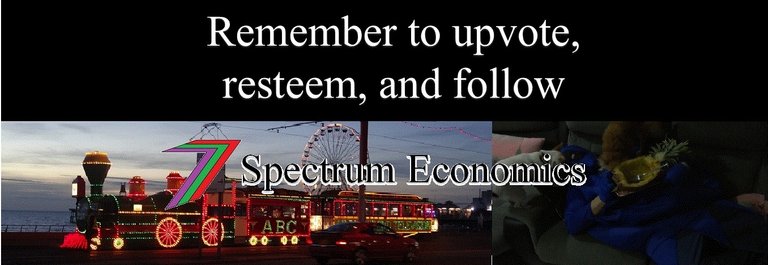









In the mathematics of social choice theory, there are a lot of unusual results about 2-party versus +2-party electoral systems.
Check out the Gibbard–Satterthwaite theorem:
https://en.wikipedia.org/wiki/Gibbard%E2%80%93Satterthwaite_theorem
And the more famous Arrow's impossibility theorem:
https://en.wikipedia.org/wiki/Arrow%27s_impossibility_theorem
I always cite these two theorems when people talk about the problems with 2-party electoral systems.
Thanks for sharing these links @petrmisan.
You missed the mathematical reason for the two party system. It is a systemic property and two parties are the most stable state. ..and the people in power know this. Bribing and coercion is more efficient if you can limit the number of people.
If you wanted Australia or USA to have more than 2 viable parties, all you would have to do is change how votes are cast. Instead of the winner takes all system, do something like have voters order the candidates by preference and sum the preference totals. If there are only 2 candidates, it reduces to become identical to the current system. With more than 2, diametrically opposed parties cancel and a voters 2nd or 3rd choice would typically be elected.
Thanks @dsonophorus for this information. I was thinking it would be better not to have any parties. The parties themselves act as control mechanisms even in a environment where there are more than 2 viable parties.
Are you referring to the famous results in the mathematics of social choice theory?
Australia already has a preferential voting system.
i like how it shows Brazil as "multi-party system" when we have just two parties and a few ambushes.
The map does not include what I call de facto two party systems. Many countries have a multi-party system in name and not practice. I am not particularly familiar with the Brazilian political party system but I imagine that it has many of the problems of the two-party system that I have highlighted in this post.
@spectrumecons, you just received an 77% upvote worth 21.786 USD from @sostrin and powered by smartsteem. Our goal is to support quality posts and authors on steem.
We offer vote-bidding (whitelist-only), vote-buying, vote-selling and a delegation market. Join the community: https://smartsteem.com
False democracy, not even close to what its aim originally was, "rule of the people". Interesting post with great structuring @spectrumecons. Resteeming this.
Thanks @naruvus for the resteem. The world is full of false democracy. It's sad so many still fall for it. Saying that, a lot more people are waking up and realising the truth.
the oligarchy has been fucking our shit up for a while now
You have every right to be unhappy.
Nice post spectrumecons
Thank you @temmy8284, I'm glad you enjoyed reading my post.
This post has received a 19.51 % upvote from @booster thanks to: @spectrumecons.
Amen.. 2 party system drives me crazy, hate how presidents mold themselves to fit one of the parties just to get elected and it even seems like some people mold their believes/viewpoints to fit "their" party.
The system is rigged. If someone is not in one of the major parties, they will never become Prime Minister or President. The system prevents independents or those from the minor parties from having a voice.
The UK's 'first-past-the-post' voting system, and political system, in general, are democratically flawed yet we claim to live in a complete democracy.
Nice post, upvoted :)
Thanks @harryp3. The more I look into how the system operates, the more apparent it is that we are very far away from a complete democracy.
This post has received gratitude of 12.46 % from @appreciator thanks to: @spectrumecons.
Excellent post, very well done
Thanks @loomy.
New post.
Yeah, thanks.
“The smart way to keep people passive and obedient is to strictly limit the spectrum of acceptable opinion, but allow very lively debate within that spectrum....”
Thank you for this GEM of an article.
Thanks @cryptonik, just trying to help get the message out about the political system we live. Too many people are brainwashed into thinking we live in a democracy.
We are even adding to the problem ourselves by imposing political correctness on others.
@originalworks
The @OriginalWorks bot has determined this post by @spectrumecons to be original material and upvoted(1.5%) it!
To call @OriginalWorks, simply reply to any post with @originalworks or !originalworks in your message!
@spectrumecons 5.5$ added to your post
It never ceases to amaze me how so many people in Australia act as though their preferential voting system doesn't exist and that they have the same broken system as the US.
There are micro parties and independent candidates out there whose values are going to be a close match to those of any voter, but the problem is that people don't look - they just keep siding with a 'team'.
I think it is a combination of a number of factors. The minority parties don't have a voice because of a lack of funding therefore do not get votes. The lack of votes results in the minority parties not getting more funding in order to have a louder voice. The media like to ridicule or ignore minor parties and independent candidates. The Australian public seem to believe the only way to get rid of a bad labor government is replace them with a bad liberal government which they can replace with a bad labor government at the next election. The public are brainwashed into thinking labor or liberal are the only options. Many believe a vote for another party or an independent is a wasted vote as it won't contribute to getting rid of the bad government they have. There is always the option of using the preferential voting system to rank the two major parties last and second from last.
Personally, I'm not in favour of any parties at all. I believe the role and power of government needs to be greatly reduced.
I agree with your analysis, but there's always the example of PHON - they had a message that resonated with a particular group and was deemed newsworthy. The free promotion that they got from the media was incredible.
The role of government is to make people's lives better than they would be without government. In that sense, I think that the role needs to be increased - the current problem is that it's being ignored in favour of doing favours for the coal industry, etc.
Have you read Gave of Mates by Cameron Murray?
I haven't read 'Game of Mates', it sounds like an interesting read.
You are right, the intended role of government is make people's lives better. Unfortunately it isn't working out that way. The government care much more about big business and themselves than they do about the people they are supposed to be serving.
Pauline Hanson has received a lot of attention. I think that attention won her quite a few votes even though most of that attention has not been particularly complimentary. She also got quite a boost from the rise of Donald Trump in the US. People see her as anti-establishment.
People see Pauline Hanson as anti-establishment, even though she usually votes with the Liberals - especially for legislation that screws over workers. People see Labour as left wing, even though they're neoliberal and voted to take away our right to privacy, increase the retirement age, etc. It's all skewed.
Game of Mates was published this year, so the stories about how politicians in Australia do favours for their mates are pretty current.
Alas people are forced into the hobsons choice where they do not think their vote counts hence enforcing the status quo.
Sad but true. Would you rather your vote counts for nothing or counts for something that you don't want?
A great question in a two party system the illusion is choice, the only way to breakdown such a system is to start by tearing down the local governance then move onto the state level with a strong group of parties to execute a strong challenge at the federal level. The mistake I think is that parties try to run every four years if a third party tried a serious campaign and pooled funding every 12 years they may be able to build a lot of capital. Social media is a weapon that is very powerful when used properly hype campaigns towards the future is the best way to build a new chance at governance.